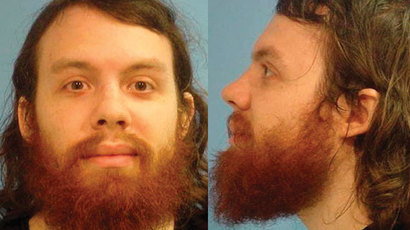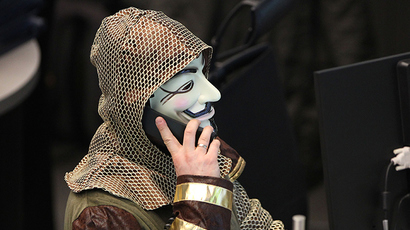Payback 13: Last of Anonymous anti-copyright hacktivists sentenced in Virginia

A terminally ill Ohio man, alleged by authorities to have played a pivotal role in the online operations of hacktivist group Anonymous, has been sentenced to six months home confinement for his part in a massive 2010 digital protest.
At a Friday morning sentencing hearing, Dennis Collins of Toledo — the last of 13 defendants charged in a lengthy computer fraud indictment filed in the Eastern District of Virginia in 2013 to learn his fate — eluded what federal guidelines suggest should have been a year of incarceration.
Instead, Judge Liam O’Grady ruled from an Alexandria, VA courthouse that Collins should be more or less restricted to his home for the next six months, citing the defendant’s apparent disability brought on by a disease doctors told him is progressive and incurable.
BREAKING: #Anonymous hacktivist Dennis "Owen" Collins sentenced to 6-months home confinement for role in 2010 DDoS campaign. Story to come.
— Andrew Blake (@apblake) February 20, 2015
Clad in a black hoodie and carrying a portable oxygen machine required to breathe, the grey-haired Collins, also known by his online alias “Owen,” walked out of Friday morning’s hearing with a grin. Prior to entering a plea agreement with prosecutors last year, he faced a potential 5-year prison sentence and up to $500,000 in fines and restitution if found guilty of conspiracy to attack a protected computer. Nearly four years after he first came under investigation, Collins pleaded last September to one count of conspiracy to intentionally cause damage to a protected computer, a misdemeanor.
‘Targeting the bastards’
Collins and a dozen others were charged in 2013 with what the Justice Department called a coordinated series of cyber attacks waged by Anonymous [PDF]. They had targeted the websites of the Recording Industry Association of America, the Motion Picture Association of America and the United States Copyright Office. The campaign of digital civil disobedience was called “Operation Payback” and was undertaken by upwards of thousands of hacktivists in late 2010.
Starting September 2010, participants in Anonymous-affiliated chat rooms plotted against targets that were opposed to certain websites, including torrent directory The Pirate Bay, which enables users to freely download digital copies of movies, music and other works, albeit in contravention of copyright law.
"We target the bastard group that has thus far led this charge against our websites, like The Pirate Bay. We target MPAA.ORG!” said a flyer circulated by Anons over Internet Relay Chat (IRC).
"This will be a calm, coordinated display of blood," the flyer said. "We will not be merciful."
According to the initial criminal indictment filed in Virginia, Collins and a group of a dozen co-defendants, labeled the “Payback 13”, conspired to take the RIAA and MPAA websites down. They used a freely available tool to launch distributed denial-of-service, or DDoS, attacks. These deliberately overload a targeted server with illegitimate web traffic and if successful jam it entirely.
Attorney Richard D. Green, speaking on behalf of the US government, said at Friday’s hearing that Collins went from being a casual observer to the DDoS campaign to becoming a direct attacker. Green further charged Collins went as far as to providing guidance to others and even the infrastructure that enabled Anons to plot. “Owen” was an operator on an IRC server where many of the plans were hatched, AnonOps, according to past reports, and in court this week Green called Collins “one of the more involved defendants in the conspiracy.” In a pre-sentencing statement filed in District Court last week, US Attorney Dana Boente wrote that “Defendant Collins frequently displayed leadership efforts” within Anonymous.
“Notwithstanding Defendant’s admitted leadership role, the circumstances of the offense call for leniency,” John Kiyonaga, Collins’ attorney, countered in the defense’s own filing earlier this month.
“Defendant acted purely from the conviction, misguided but genuine, that his conduct promoted the free flow of information. He made absolutely no profit, nor did he access any information to which he was not entitled.”
‘I never harmed society; I contributed to society’
On Friday, Kiyonaga argued before Judge O’Grady that the nature of his client’s crime “scores very low in terms of its banality.” Collins “was acting on principle” and trying to make a difference when he participated with Anonymous, he said, and Collins’ quality of life and his need to constantly tend to his mother — an octogenarian suffering from two forms of cancer herself — had made him practically a shut-in. Collins’ activities with Anonymous, largely conducted from his basement in Ohio, presented not just an opportunity to make a difference in the digital sphere, his attorney argued, but an escape from reality.
“The Internet is a strange world,” Kiyonaga said. “It creates its own reality.”
Collins, his attorney added, believed “DDoS was a laudable thing to do.”
“I never harmed society; I contributed to society,” Collins said when he briefly addressed Judge O’Grady in a in a low grumble — a timbre presumably a result of the stage-4 chronic obstructive pulmonary disease that has left him with only 16 percent usage of his lungs.
When Judge O’Grady inquired about Collins’ targets — specifically the US Copyright Office — the defendant was unable to explain why he had singled out certain websites over others.
“Trust me, there was far more targets that I thought were more deserving than the Copyright Office,” he told the court.
Wow. Owen does not have to go to jail. I am very happy. #Anonymous#Paypal14
— Touya Akira (@ClipperChip) February 20, 2015
Indeed, when MasterCard, Visa and PayPal announced near the end of 2010 that they would stop processing funds intended for WikiLeaks in the wake of the antisecrecy group’s decision to publish a trove of leaked State Dept. cables, Anons set their sights elsewhere and attempted to take the financial firms’ websites offline with a similar campaign of internationally-dispersed DDoS attacks. Collins and 13 others — the “PayPal 14” as they have been dubbed — were indicted in the Northern District of California in 2011 over their involvement in that operation. Yet while that case has largely been resolved, the filing of new charges against Collins in Virginia in 2013 precluded him from participating in the plea agreements that have allowed his dozen co-defendants on the opposite coast to walk away years later with mostly slaps on the wrist.
The sentence imposed by Judge O’Grady on Friday — six months of home confinement, sans electronic monitoring — was a far cry from the year recommended by federal sentencing guidelines. Destruction of computers as a means of protest, O’Grady said, is not a lawful way to proceed with making a point, and if Collins and his colleagues “wanted to make First Amendment statements, they can do so in a lawful matter.” Nevertheless, O’Grady veered away from the idea that incarceration would serve as a deterrent to others interested in waging attacks like those launched against the RIAA and others — while acknowledging, nonetheless, that Anonymous remains “intact, as far as I can tell,” nearly a decade after the amorphous hacktivist collective first began waging online operations under that label.
‘Disparity of consequences’
With Friday’s sentencing, all members of the “Payback 13” have now gone through the court system and are next expected to meet in the coming months to discuss restitution. According to prosecutors, the Virginia defendants caused $8,917,010.82 in damages through their 2010 campaign, not to mention the damages done in the pro-WikiLeaks operation shortly thereafter.
"We're pleased to see one part of this extremely long and tedious fight wrap up, we can only imagine how excited Owen must be to have the end of this in sight," a hacktivist who shared administrative duties on the AnonOps IRC server told RT.
Today my good friend Dennis Collins got six months home confinement, no electronic monitoring & one year probation. thanks @BarackObama
— anonpanda (@RealAnonpanda) February 20, 2015
On the opposite side of the country, however, Collins has yet to be convicted related to the anti-PayPal operation waged shortly after Anons launched their anti-copyright campaign. With the Virginia matter aside, docket reports suggest Collins will resume handling that matter early next month, with a status conference currently scheduled for March 2.
Greene, the US attorney, deferred comment to the Eastern District of Virginia’s Public Affairs Office, which declined to weigh in when reached by RT. Kiyonaga did not immediately respond to RT’s request for comment. An individual who did offer to weigh in, however, is Andrew Auernheimer —a hacker who went through the US justice system for more than three years before a conviction for computer fraud was overturned by the Fourth Circuit Court of Appeals in 2014.
“The disparity of consequence for crimes involving computers is ridiculous,” Auernheimer told RT’s Andrew Blake. “If Owen had done the real-world equivalent of a sit-in, his criminal trespass would be a misdemeanor with a maximum penalty of thirty days confinement. Here the government hits him with a felony and wants a year of his life.”
Last month, the Obama administration proposed changes to the country’s federal hacking law — the Computer Fraud and Abuse Act — which, if approved by Congress, would rewrite the legislation used to charge Collins, Auernheimer and hundreds of others, by means of substantially increasing the potentially sentences for CFAA violations, among other revisions.














